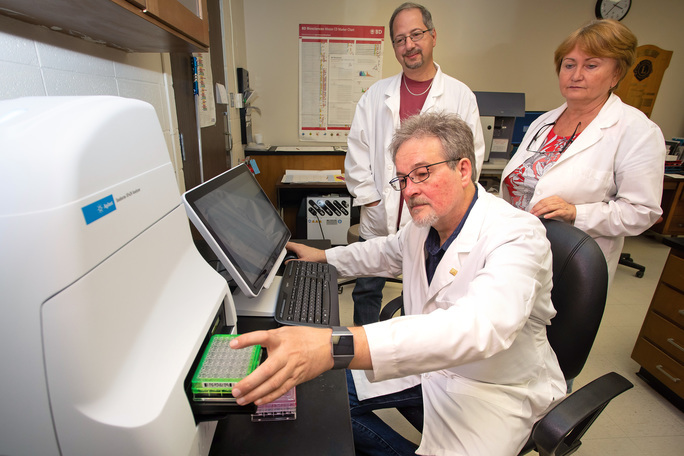USA Health awarded NIH Instrumentation Grant
The new equipment will enhance biomedical research across USA and help investigators maintain their competitiveness for extramural funding.
By Nichelle Smith

Together, 11 investigators at the University of South Alabama College of Medicine and USA Health Mitchell Cancer Institute recently received a shared instrumentation grant from the National Institutes of Health (NIH) to purchase a Seahorse XFe24 extracellular flux analyzer.
According to Mikhail Alexeyev, Ph.D., professor of physiology and cell biology at the USA College of Medicine, the new equipment will enhance biomedical research across USA and help investigators maintain their competitiveness for extramural funding.
“This instrument measures the bioenergetic health of the cells and tissues by measuring various parameters of mitochondria – the cellular powerhouses,” Alexeyev said. “All cells need energy to survive and ATP is the universal energy currency in our bodies. Mitochondria produce the bulk of ATP in most cells – hence, the designation of powerhouses – and it has been long since known that mitochondrial function is altered in aging and disease.”
Some extreme examples of mitochondrial malfunction include mitochondrial diseases – which are often incurable, lethal disorders with very limited palliative treatment options – and cancer, in which mitochondrial function is altered dramatically.
Alexeyev, who serves as principal investigator on the grant, said this new tool has far reaching potential to impact patient care. “By helping improve our understanding of the mechanisms of disease, this instrument holds the potential to develop effective treatments for a wide range of diseases,” he said. “In particular, it will help researchers at USA who are involved in projects to advance their respective fields of study. Specifically projects investigating mitochondrial disease, mitochondrial DMA damage and repair, vascular physiology and pathology, cellular metabolism, host-pathogen interaction, immunology, cancer biology and cell biology.”
Additional investigators at the USA College of Medicine participating in this grant include Mary Townsley, Ph.D., senior associate dean and professor of physiology and cell biology, Troy Stevens, Ph.D., Lenoir Louise Locke Chair of Physiology and Cell Biology, Mark Gillespie, Ph.D., professor and chair of pharmacology, Richard Honakanen, Ph.D., professor and chair of biochemistry and molecular biology, Robert Sobol, Ph.D., chief of molecular and metabolic oncology, Sarah Sayner, Ph.D., associate professor of physiology and cell biology, Steve Lim, Ph.D., assistant professor of biochemistry and molecular biology, Jonathon Audia, Ph.D., associate professor of microbiology and immunology, Robert Barrington, Ph.D., associate professor of microbiology and immunology, and Diego Alverez, Ph.D., associate professor of physiology and cell biology.




